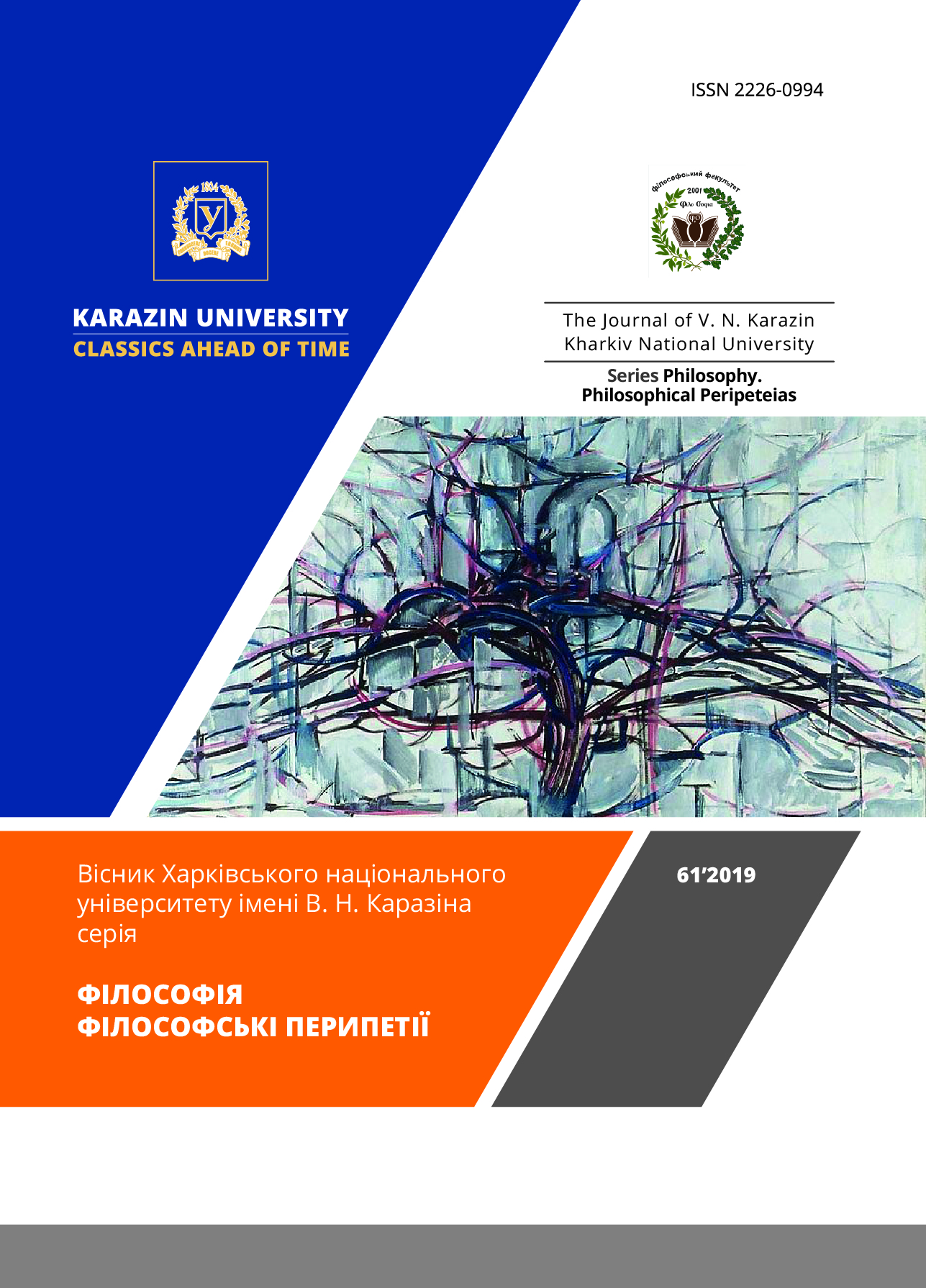YURIY MAMLEEV’S CREATIVE WRITINGS: PHILOSOPHY AND / OR LITERATURE?
Abstract
The author of the article studies the creative legacy of Yuriy Mamleev, trying to establish the correlation between of his philosophical and fiction writings. The conventional editorial distinction between philosophical and literary texts as different and autonomous categories (where philosophical texts are “The Destiny of Being” and “Eternal Russia”, the rest are fiction) is rejected. Instead of the idea, that philosophical and fictional aspects of texts by Mamleev are inextricably linked, it is claimed that they should be considered together. In the author’s opinion, these texts present different perspectives and implementations of his oeuvre that contains the rational dimension (which requires categorical language of philosophy) and on the other hand – irrational dimension of artistic images and obscure allusions. Mamleev’s writings considered by means of 5 crucial “metathemes”: Аbyss and the “Ultimate relationships” concerned with it, the Mystery which has two levels – one cognizable and the another – uncoognizable in principal, the “root of self-being” and metaphysic (utrism) of “I”, death and immortality, Russia and the Russian soul which are existed between West and East with special historical and cosmological mission. It is concluded that these 5 metathemes pervade all Mamleev’s texts and comprise his spiritual search. The characters of Mamleev’s fiction are mostly people of post-Soviet world, who ask questions with no set answers to become acquainted with the secrets of being. At the same time they are concerned with their own existence, their self destiny. Their actions are extraordinary and illogical. Supposedly Mamleev’s artistic images not only correspond with his philosophical ideas, for instance – utrism or the “Ultimate relationships”, but also reveal them from unexpected perspective. The author determines that distinction between philosophy and literature of Mamleev is incorrect, as these areas are conflated. Any distinction of this kind will ruin the logic of Mamleev’s thinking and outlook. Thus, metaphysical realism (that Mamleev founds) can be viewed as the crossing, distinction blurring area, productive and creative transgression. Or as the situation when philosophy (and literature) is more than it is itself.
Downloads
References
/References
Deleuze, J., & Guattari, F. (2009). What is Philosophy? (S. Zenkin, Trans.). Moscow: Academic Project. (Original work published 1991). (In Russian).
Mamleev, Yu. (2011). Eternal Russia. Moscow: Eksmo. (In Russian).
Mamleev, Yu. (1993). Favourites. Moscow: Terra. (In Russian).
Mamleev, Yu. (2008). Living Cemetery. Moscow: AST; Zebra E. (In Russian).
Mamleev, Yu. (2003). Pensive Killer. Moscow: Vagrius. (In Russian).
Mamleev, Yu. (1986, September 5). Planet of Sleepless Bears. [Conversation with Yuriy Mamleev in connection with the French edition of the novel “Shatuny”]. Russkaia Mysl – Russian Thought, 3637. Retrieved from http://www.radashkevich.info/publicistika/publicistika_205.html. (In Russian).
Mamleev, Yu. (2009). Russin Trips to the Subtle World. Moscow: AST; Zebra E. (In Russian).
Mamleev, Yu. (2009). The Destiny of Being. Moscow: Enneagon. (In Russian).
Semykina, R. (2007). On “Contact with Other Worlds”: F. M. Dostoevsky and Yu. V. Mamleev (Monograph). Barnaul: BSPU. (In Russian).
Slobozhanin, A. (2014). Philosophical Content of the Stories by Yu. V. Mamleev. In Research Potential of Young Scientists: A Look into the Future (Tula, 2014). Intern. Conference Proceedings (pp. 149–157). Tula: TSPU named after L. N. Tolstoy. (In Russian).
Yevtushenko, N. (2009). Metaphysics and Literature: Fiction by Yu. Mamleev in the Context of the Philosophical Experience of a Writer. Stavropol State University’s Vestnik, 60, 59–63. (In Russian).
Делез Ж., Гваттари Ф. Что такое философия? / пер. с фр. С. Зенкин. М.: Академический Проект, 2009. 261 с.
Евтушенко Н. Метафизика и литература: художественная проза Ю. Мамлеева в контексте философского опыта писателя. Вестник Ставропольского государственного университета. 2009. № 60. С. 59–63.
Мамлеев Ю. Живое кладбище. М.: АСТ; Зебра Е, 2008. 352 с.
Мамлеев Ю. Задумчивый киллер. М.: Вагриус, 2003. 304 с.
Мамлеев Ю. Избранное. М.: Терра, 1993. 648 c.
Мамлеев Ю. Планета незаснувших медведей. Беседа с Юрием Мамлеевым в связи с французским изданием романа «Шатуны» [Электронный ресурс]. Русская мысль. № 3637. 1986. URL: http://www.radashkevich.info/publicistika/publicistika_205.html.
Мамлеев Ю. Россия Вечная. М.: Эксмо, 2011. 512 c.
Мамлеев Ю. Русские походы в тонкий мир. М.: АСТ; Зебра Е, 2009. 254 c.
Мамлеев Ю. Судьба бытия. М.: Эннеагон, 2006. 262 c.
Семыкина Р. О «соприкосновении мирам иным»: Ф. М. Достоевский и Ю. В. Мамлеев: монография. Барнаул: БГПУ, 2007. 241 с.
Слобожанин А. Философское содержание рассказов Ю. В. Мамлеева. Исследовательский потенциал молодых ученых: взгляд в будущее: материалы конференции. Тула: ТГПУ имени Л. Н. Толстого, 2014. С. 149–157.
Citations
"ABYSS" BY YU. V. MAMLEEV: GENESIS, DYNAMICS OF DOCTRINE, ONTOLOGICAL PROBLEM
Honcharov Semen (2021) The Journal of V. N. Karazin Kharkiv National University, Series "Philosophy. Philosophical Peripeteias"
Crossref
Authors who publish with this journal agree to the following terms:
- Authors retain copyright and grant the journal right of first publication of this work under the terms of a license Creative Commons Attribution License 4.0 International (CC BY 4.0).
- Authors are able to enter into separate, additional contractual arrangements for the non-exclusive distribution of the journal's published version of the work (e.g., post it to an institutional repository or publish it in a book), with an acknowledgement of its initial publication in this journal.
- Authors are permitted and encouraged to post their work online (e.g., in institutional repositories or on their website) prior to and during the submission process, as it can lead to productive exchanges, as well as earlier and greater citation of published work.






3.gif)




